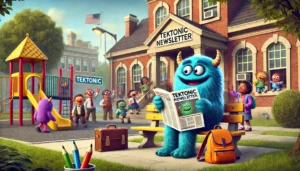Welcome back to our TekTonic newsletter. This week, we heard about the rapid rise of AI-driven productivity tools like ChatGPT’s to-dos and Microsoft’s pay-as-you-go agents, the growing push for AI innovation in governments (from PM Starmer’s AI superpower plan to President Biden’s data center initiative), and the often-unseen challenges—such as overheating chip racks and water-intensive data centers. We’ll also explore breakthroughs like Illumina’s collaboration with NVIDIA in genomics, schools banning phones to boost student grades, and the legal spotlight on tech giants, from Elon Musk’s SEC lawsuit to Meta’s alleged copyright infringements. On top of that, quantum computing, universal basic income, and next-gen collaborations in healthcare round out a packed week of developments. So let’s get started.
Recent discussions on AI’s impact on daily life continue to surge, with “Why AI Progress Is Increasingly Invisible” highlighting concerns that behind-the-scenes advancements may leave the public unprepared for rapid change. Meanwhile, Prime Minister Starmer’s plan to make Britain an AI superpower emphasizes pro-innovation regulation. Personal productivity also gets a boost: ChatGPT now supports repeating to-dos, while dating apps are jumping into the mix with Hinge using AI to grade prompts. At the same time, Sam Altman warns AI might ramp up faster than previously predicted. And for those following quantum developments, Microsoft’s declaration of a ‘Quantum Ready’ year signals new urgency in tech preparedness. Other notable updates include OpenAI’s language-switching AI reasoning model, Amazon’s plan to relaunch Alexa as an AI agent, Google Search hitting a new low in market share, discussions on a $1000 monthly universal basic income, OpenAI’s potential brink of AGI, and concerns about AI data centers impacting zero emissions pledges.
Microsoft’s release of MatterGen, an advanced AI tool for materials discovery, promises a leap forward in identifying next-generation compounds. Additionally, Nvidia’s new “multiverse simulation engine” can generate diverse real-world conditions to train future self-driving cars and robots, signaling a new era of simulated AI training.
In the corporate world, Salesforce’s decision to freeze software engineer hires by 2025 highlights how AI boosts developer productivity and reshapes jobs. Meanwhile, experts are debating AI’s role in financial advising, cautioning that while chatbots can assist with basic tasks, they’re less reliable for complex portfolio decisions. Unions also raise concerns: labor groups warn about AI’s potential for workplace surveillance and discrimination. Microsoft’s recent layoffs in various divisions show that tech giants continue re-balancing talent as AI transforms business priorities.
Audience trust and regulation issues loom large in media. According to Forbes research, 55% of audiences feel uneasy about AI-generated content, calling for greater transparency. Meanwhile, Meta faces a lawsuit alleging the use of pirated data to train its models, and one company is offering $3,000 for people to quit social media for a month—underscoring data privacy and well-being concerns. Tighter data extraction policies are also in effect, as Google’s crackdown on web scrapers disrupts popular SEO tools.
The legal and regulatory implications of tech investments are under the spotlight too. The SEC has filed suit against Elon Musk over his Twitter takeover, alleging failures in timely disclosure. The outcome could influence how tech acquisitions and free-speech commitments intersect with securities law.
AI’s impact on developers continues to evolve as Mark Zuckerberg predicts AI could replace mid-level software engineers. Microsoft’s AutoGen 4.0 promises more robust agentic AI systems while “shadow AI” usage among developers grows, raising security concerns. And if you want to join in the action, Elon Musk’s latest call for software engineers shows that big ideas can trump formal credentials.
As AI accelerates, security experts see new threats and responsibilities on the horizon. The government aims to strengthen reporting standards with an updated plan for AI-related hacking incidents. CISOs feel squeezed, with gen AI risks adding pressure to balance innovation and safety. Meanwhile, Orchid Security’s stealth emergence with a $36M seed round shows ongoing investment in advanced AI threat detection is progressing.
AI’s appetite for hardware remains strong. Reports suggest Nvidia’s big buyers might be delaying orders for its Blackwell racks due to concerns over overheating, reflecting the complexities of next-gen chip demands. At the same time, engineering is undergoing a revolution, with new AI systems cutting microchip design time from weeks to hours.
Microsoft pushes deeper into AI services with “pay-as-you-go” AI agents, aiming to automate recurring tasks for enterprise users. Meanwhile, Elon Musk’s xAI rolled out a free web version of its Grok chatbot, and OpenAI introduced ChatGPT Tasks—all signs that agentic AI are beginning to emerge regardless of the public’s demand.
AI’s classroom reach broadens, but privacy, reliance, and academic integrity concerns persist. According to a new report, teachers and students adapt more quickly than parents to EdTech’s risks. Elsewhere, a school banning phones saw grades improve dramatically, stirring debate over device policies. Academics worry that students over-rely on AI, while Microsoft’s partnership with Pearson aims to upskill learners in AI fundamentals.
US leadership in AI infrastructure received a jolt with President Biden’s executive order to expand advanced data centers, though questions remain over sustainability and power grid impact. Similarly, the US Marines plan to integrate AI while cautioning about “blind trust carefully.” Philosophical debates, like whether AI could replace politicians, intensify as the Army eyes new genAI tools to streamline operations.
In medical news, Illumina’s collaboration with NVIDIA promises AI-accelerated genomic analysis, while the Mayo Clinic’s digital pathology initiatives are opening doors to faster disease detection. Columbia researchers debuted a new AI method for predicting gene activity, and the overall sector sees an uptick in VC funding thanks to AI. Recently, Cerebras joined forces with the Mayo Clinic on an advanced genomic AI model. OpenAI linked up with Retro Biosciences to create a model that improved stem-cell related protein effectiveness by 50X!
Mercedes-Benz transforms in-car experiences with a new Google-powered AI agent, enabling personalized voice interactions and advanced navigation.
That is it. Stay tuned for more news next week. I APPRECIATE ALL THE READERS. Help spread the word. I put these newsletters together so productive humans like you can stay on top of the latest AI stories shaping our world.
If you like these weekly tech news reports, subscribe to get notified of new editions and updates. For daily updates, check out our news page. For a more in-depth analysis of the week’s news, sign up for our free weekly newsletter to the right of the daily news, or follow me on Twitter or YouTube.



